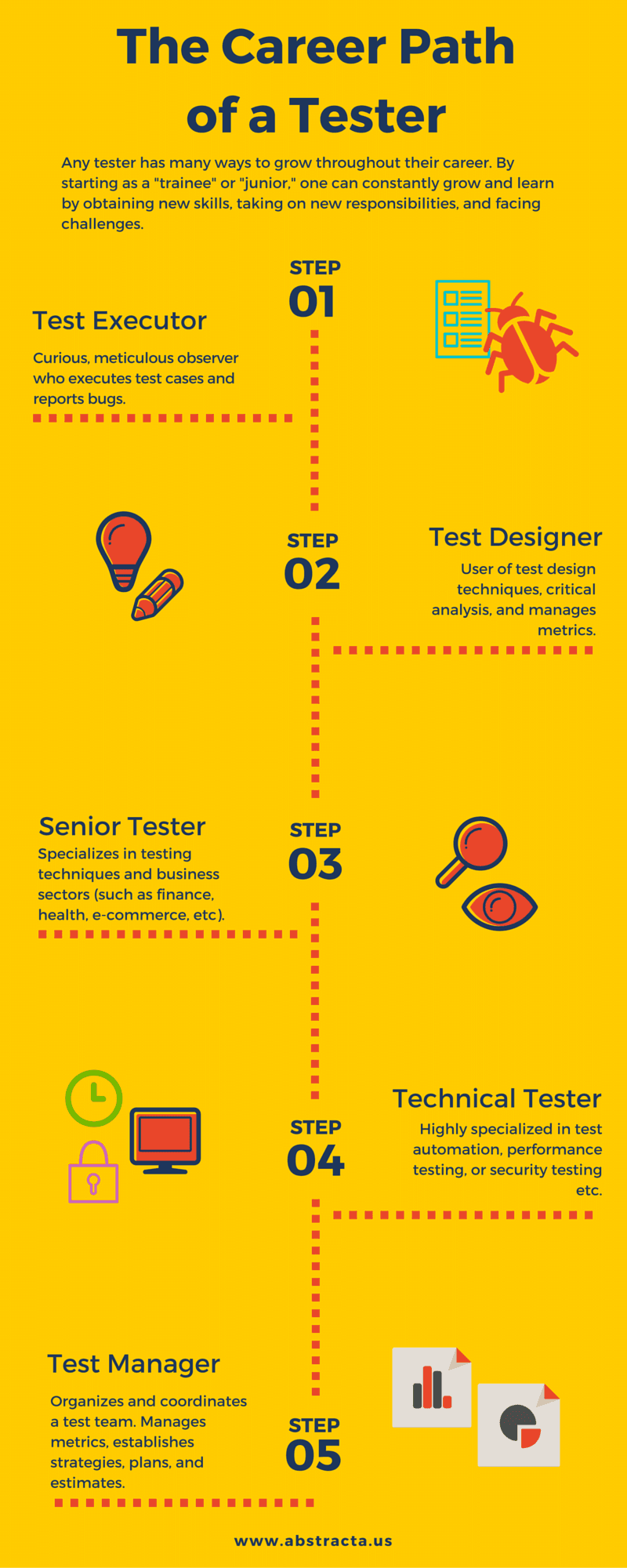A look at the potential career path of a software tester in 5 steps
A question that everyone has when starting out in testing is: What kind of future career can I have? Some career paths or job positions lead to dead ends in which there are no opportunities for growth or advancement and others foster continuous learning, allowing one to move up naturally.
This is what happens in the area of testing: with time and practice, we become better testers and can aspire for better positions, higher salaries, more responsibilities, more challenging tasks, and more training. We always continue learning and eventually our capabilities become greater than what our position calls for.
In reality, there is not one “career path of a software tester” as one can take many different paths, specializing and growing in a certain branch of testing or moving into other business areas. It is good to have it clear in your mind which path you want to take beforehand, in order to know which skills to hone, which projects to take on, etc.
In the following infographic you can see an outline that represents some of the possibilities that you have as you move up in testing.
The Ministry of Testing created a very detailed mind map in which they did a very good analysis of the future of software testing, and in particular, the possible career path of a software tester.
Here we will break down some of the possible ways one can advance in testing. Keep in mind that everyone will end up having a journey uniquely their own. One of the greatest advantages of software testing, I think, that other IT professions don’t have is that you can get started with little technical background in programming and the like.
Part of the analysis done below is based upon the survey of wages in the world of testing that expo:QA conducted.
Starting Out
Someone without much experience aspires to be a “junior tester” and works as a “trainee” or a “practitioner.” A junior tester is typically considered anyone with less than two years total of testing experience. The projects that they are assigned vary by the team, but they usually carry out these tasks:
- Execute tests
- Report Bugs/ Defects
- Design simple test cases
- Occasionally help with other quality assurance activities
Gaining Experience
After executing tests for a while, one accrues much practice with and knowledge of different tools and tests. One begins to see where applications typically fail, understanding more and more about how software is constructed. One also develops better communication skills. From this point, one can move to the next level, which is to be a “semi-senior” tester or “mid-level” tester. Mid-level testers usually have 2-4 years of experience in testing. The responsibilities they may have include:
- Execute tests
- Report bugs/defects
- Design complete test cases
- Be more and more involved in other quality assurance activities
After this, one becomes a “Senior Tester.” Typically, a senior tester has 3-10 years of testing experience and may specialize in testing applications that are made for certain industries such as finance, healthcare, tech, etc.
QA Consultant
People with experience in the testing field can go into specialized services. This is where consultants come into play, which basically add value with their knowledge and experience by identifying problems and suggesting improvements to teams, teaching them tools to use or how to adapt to processes and methodologies.
If you want to take the consulting path, I highly recommend this book by Gerald M. Weinberg, The Secrets of Consulting: A Guide to Giving and Getting Advice Successfully. I am reading it now and I love it!
Test Leader / Test Manager
Next come the management roles. These people are in charge of organizing the work that needs to be done and assigning testers to do specific tasks.
In accordance with the years of experience one may have, we see people who are “junior test managers” or “senior test managers.” The size of the teams that they manage correlates with how much experience they have. In some businesses, one person has to manage the tests of many applications, and in others, they are just dedicated to one in particular. Here is where communication, leadership, and organizational skills are essential to be successful.
Test Automator / Technical Tester
There are some testers that learn programming (or programmers that learn testing) and are able to be in charge of tasks that are more technical in testing.
These testers have the most expertise and are capable of performing very technical test cases. Here we find the people that help to automate all of the repeatable tests, known as automators. As well, the more technical testers can be focused on performance and security. Those types of testing count on extensive knowledge of operating systems, databases, servers, etc. but they are some of the possible paths that one should definitely consider for their testing career (and for me in particular, I am very passionate about!)
Is there a ceiling to the possibilities?
One last thought, in response to the Spanish version of this post that I wrote, many people have asked me more questions about getting involved in testing that I want to answer here as well.
Some of the questions were:
- What if I like to design tests and execute them but don’t want to be a manager or get into very technical testing?
- Are these timelines of growth fixed?
- What comes after all of these positions? Is there a ceiling to the possibilities?
As you go along in your testing career, you will begin to discover what areas you do and do not like and will get a better feeling for the possibilities that are available to you. For example, as you work in a team and see the synergy that exists, you may be interested in learning how to organize projects and divide up the work, becoming a test manager.
Another example could be you notice that some tests can be automated to save time and eliminate the need to do repetitive things. Then, you may find out that you want to learn automation and acquire this new skill that you didn’t have before.
Of course, after all of the possible paths that we mentioned before, there are still dozens more. One can specialize in the agile world, vary in the types of tests and tools, become an expert in the area of business, conduct research in the field of testing, or inspire others to become testers by speaking at conferences, attending meetups, and disseminating knowledge through blogs (like this one!), social media, or teaching courses and workshops.
If you take up testing, your career path is certainly not set in stone and there’s not just one way to grow. Some people will move more quickly through the stages than others. To advance, one should get carried away with making sure to continuously improve one’s skills, growing as a person, and exploring one’s potential.
I hope that this helps clarify the potential career path of a software tester and all of the opportunities that are open to someone who is just starting. We would like to invite you, if you’re interested, to join us over here on the dark side (just kidding, in reality, it’s more like the bright side of IT!). No matter how much experience you have (or lack thereof) feel free to contact us at [email protected], telling us what you want to learn how to test, the skills you may have already, and what kind of path you wish to take, because not only do we offer testing services, but also comprehensive, customizable training.
When it comes to the career path of a software tester, the sky is the limit!
Footnote: I am basing this off of the achievements that I have seen of many testers that I know of in the USA, Uruguay, Argentina, Spain, Italy, Brazil, and people that I have come across in conferences, meetups, etc. I also read many of my peer’s articles, etc. and I feel inspired by them. Thanks to all of you, I realize that there really is no ceiling to software testing!
Want to learn more about starting a career in testing? Check out this podcast episode!
Recommended for You
[Infographic] Why Should I Become a Performance Tester?
The Software Testing Wheel
Tags In


Federico Toledo, Chief Quality Officer at Abstracta
Related Posts
Quality Sense Podcast: Gev Hovsepyan – Accessibility Testing
Welcome to another episode of the Quality Sense podcast! Today I’ll share with you an exchange I had with Gev Hovsepyan. He’s the Head of Product at mabl with over a decade of experience in Software Product Management, Analysis, and Development for B2B SaaS and…
Abstracta Turns 12!
Federico shares his reflections on what Abstracta means to him and all of us Today Abstracta celebrates 12 years, (a fitting topic to mark our 200th blog post)! That is, 12 years since the moment in which Matias Reina, Fabian Baptista and I took a…
Search
Contents









